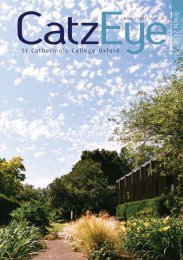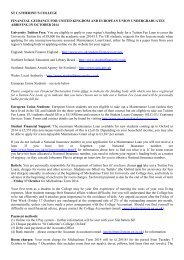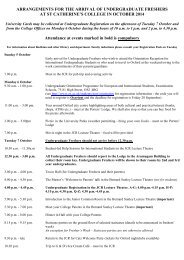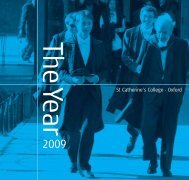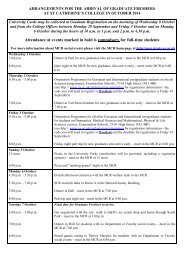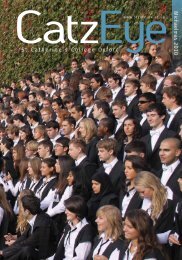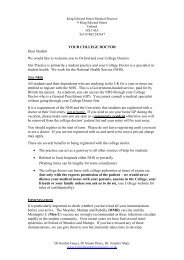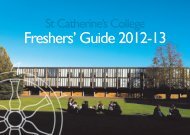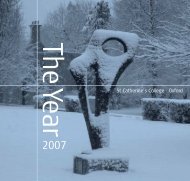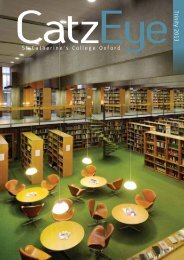Download PDF - St. Catherine's College - University of Oxford
Download PDF - St. Catherine's College - University of Oxford
Download PDF - St. Catherine's College - University of Oxford
You also want an ePaper? Increase the reach of your titles
YUMPU automatically turns print PDFs into web optimized ePapers that Google loves.
GAZETTE<br />
For more than thirty years Percival served<br />
as dance critic <strong>of</strong> The Times; the first, as he<br />
proudly pointed out, to sign his name to his<br />
reviews when the paper dropped its tradition<br />
<strong>of</strong> anonymity. His capacity for watching dance<br />
was legendary, his tall figure a familiar sight;<br />
seven performances a week was nothing out<br />
<strong>of</strong> the ordinary. Virtually every cast change was<br />
covered, if press tickets were unavailable he<br />
went to the box <strong>of</strong>fice like any member <strong>of</strong> the<br />
public, and he traveled extensively, frequently<br />
at his own expense, to watch dance in Europe<br />
or the USA.<br />
John Percival was born on 16 March, 1927 in<br />
Walthamstow, East London, the older <strong>of</strong> the<br />
two sons <strong>of</strong> Cecil Percival, a railwayman, and his<br />
wife Phoebe. He attended Sir George Monoux<br />
grammar school where he proved an intelligent<br />
and hardworking pupil, eventually winning a<br />
place at Catz. His first visit to the ballet was<br />
an open-air performance by the then Sadler’s<br />
Wells Ballet in Victoria Park, Hackney.<br />
From then on he went to every dance<br />
performance he could, paying for his tickets<br />
through odd jobs, and frequently walking<br />
home to Walthamstow, even from as far away<br />
as Hammersmith. It was during this period<br />
that he met the future critic Clive Barnes<br />
(1948, English) who became a life-long friend.<br />
After two years’ hospital service (he was a<br />
conscientious objector) Percival went up to<br />
<strong>Oxford</strong> to read English, where both he and<br />
Barnes attended Catz. They were instrumental<br />
in reviving the <strong>Oxford</strong> Ballet Club and its<br />
magazine, Arabesque, which they sold in the<br />
street outside the Royal Opera House.<br />
On graduating, he looked for a job, ‘if only<br />
to pay for the ballet tickets’. He found<br />
a temporary opening with the London<br />
Ambulance Service, which led to an<br />
administrative career with the London County<br />
Council.<br />
Meanwhile he and Barnes were writing about<br />
dance for any publication that would take<br />
their work. An early outlet was the magazine<br />
Dance & Dancers with which Percival was to<br />
be closely associated until financial pressures<br />
forced its closure in 1994. His first job as<br />
a newspaper critic was for a short lived<br />
publication called The New Daily, which he<br />
cheerfully described as a ‘fascist rag’.<br />
Barnes meanwhile had become the first<br />
specialist dance critic <strong>of</strong> The Times and when<br />
in 1965 he moved to New York, Percival was<br />
invited to replace him. At that time the arts<br />
occupied just one page, so space was at a<br />
premium and it was essential to write quickly<br />
(overnight reviewing was the norm), exactly to<br />
length and very concisely. When the late John<br />
Higgins became Arts Editor both space and<br />
coverage expanded.<br />
As a critic, Percival was marked by his<br />
independence <strong>of</strong> thought which sometimes<br />
brought him into conflict with the dance<br />
establishment. He was always open to<br />
new ideas and anxious to communicate his<br />
enthusiasm to his readers. He was particularly<br />
interested in spotting and encouraging new<br />
talent among dancers, choreographers and<br />
writers.<br />
In 1997 it was decided that after thirty-two<br />
years, The Times needed a new voice to cover<br />
dance and Percival stepped down, not without<br />
some reluctance on his part. He then began<br />
regular reviewing for The Independent which<br />
continued until 2003. Even after that he<br />
reviewed regularly for the on-line magazine,<br />
DanceView Times, also writing on dance for<br />
The <strong>St</strong>age.<br />
Confined to the house by illness from<br />
2008 onwards, he continued to seek every<br />
opportunity to write, and contributed many<br />
obituaries for The Times. He was the author<br />
<strong>of</strong> a number <strong>of</strong> books on dance including<br />
biographies <strong>of</strong> Rudolph Nureyev and the<br />
choreographer John Cranko. His book about<br />
the Ballets Russes, The World <strong>of</strong> Diaghilev<br />
was described by the ballerina Lydia<br />
Sokolova as her ‘favourite book about my old<br />
company’.<br />
ST CATHERINE’S COLLEGE 2012/59



